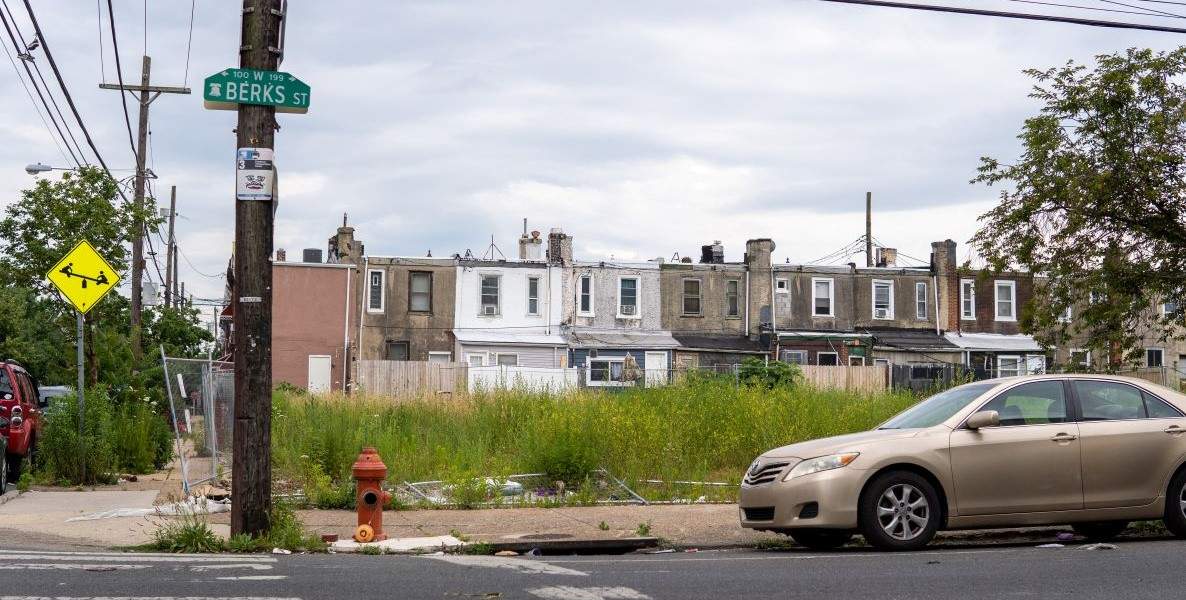Listening to the 2023 mayoral candidates talk about housing affordability in the various forums this campaign season, there is some cause for hope that Philly is finally coming around to the idea of using the City’s large stockpile of vacant land and property for mixed-income housing.
This is an idea that’s been kicking around for a long time, and the City’s made some moves in this direction. But for an equally long time, elected officials have been cross-pressured from different directions on what the priorities should be for City land. Should it mostly be housing? Community gardens and green spaces? Side yards and parking?
The Land Bank’s various strategic planning efforts have attempted to create a thoughtful decision-making framework around these issues, but from the outside looking in, it hasn’t appeared to have much political purchase with the key decision makers. The various constituencies involved in this space often disagree, and so the elected officials can’t agree either, and relatively little City land has moved as a result.
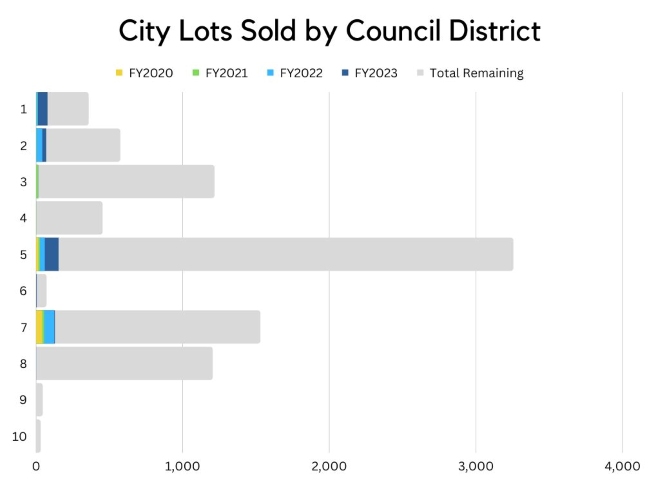
Reporting on the mayoral candidates’ campaign trail position-taking on this topic suggests most of the leading contenders support the general concept that affordable housing should be the priority for City land. But as usual, the devil is going to be in the details.
The really interesting question is whether the candidates support the general shape of the political framework that’s been established within the last few years. This framework is already modestly succeeding in getting more City land out the door for affordable housing.
For a long time, the conventional wisdom among observers of this issue has been that the Land Bank barely ever disperses City land. But for a variety of reasons, that started to change in 2022, and then really started to shift in 2023 — to the point where the old conventional wisdom now looks outdated.
The Land Bank’s Turn the Key initiative
Matthew Rothstein at Bisnow wrote about the beginning of this shift back in November of 2022.
Overall, the city owns over 5,300 lots eligible to be used in disposition programs, and has disposed of only 359 lots since FY2017, according to the city’s data dashboard for the Philadelphia Land Bank […]”
But the next two years may look very different, since nearly all of the data in PHDC’s report came before Philadelphia City Council passed its Turn The Key initiative in April. Under the program, developers will receive land to build single-family homes to be sold for no more than $280K, with the city providing financial assistance to low-income families to help cover mortgage and closing costs […]
Unlike previous policies aimed at vacant land disposition, Turn The Key is part of Council President Darrell Clarke’s $400M Neighborhood Preservation Initiative, and as such, came with real budget dollars attached.
The first group of properties to have been identified for Turn The Key is almost exclusively within Clarke’s district, District 5, which contains 37 percent of the vacant lots owned by the city. In FY2022, 34 lots were sold from District 5, while 68 such sales happened in District 7, which contains 17 percent of the city’s vacant land.
Since then, the rate of land dispositions for affordable housing has increased quite a bit more, with the Land Bank actually surpassing some of its housing goals already for the year, and coming close to reaching others. According to the City’s land management dashboard, the Land Bank has already surpassed its FY2023 housing unit goal by 17 percent, coming in at 371 units in their settled cases. The FY2023 goal was for 316 units — the same as for FY2022, which only saw 129 housing units approved on city lots.
Settled cases for housing in the 60 to 80 percent Area Median Income range are more than 150 percent over the FY2023 goal. The Land Bank is also about 81 percent of the way toward reaching their goal for housing in the 30 percent AMI range, and 92 percent of the way toward their market-rate housing goal. Disposition of land for housing in the 120 percent AMI range is only at around 41 percent of the goal.
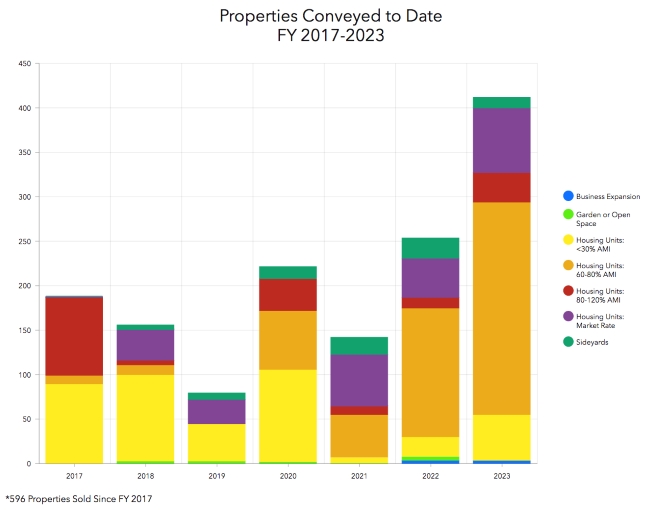
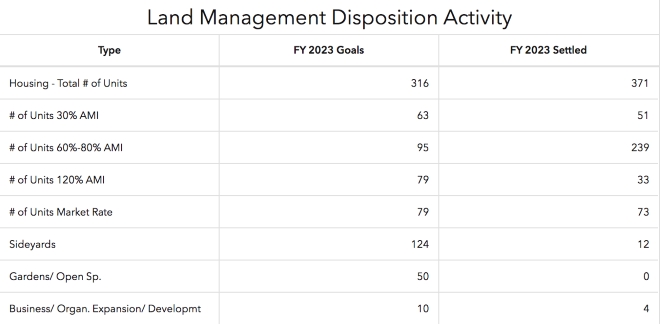
There are a few different interlocking parts that are responsible for this change, but the creation of the Turn the Key program really does seem to have changed the politics of land disposition, at least for some elected officials. That program, championed by Council President Darrell Clarke, will leverage 1,000 city lots to build at least 1,000 homes priced in the range of $190,000-$280,000, with preference going to city workers.
More new Land Bank programs
Other changes that have helped change the politics of this issue include the creation of the “51/49” program, where builders can enter non-competitive bids for City lots if their proposals feature at least 51 percent below-market rate units. And the City has also created a new Accelerator Fund that will help underwrite housing projects on city land undertaken by Black and Brown developers, alongside other efforts to provide professional development and mentorship to minority developers. Taken all together, more elected officials are looking at this system and are satisfied that it will benefit the constituencies they most want to help.
Not every elected official has been persuaded, but the ones who have been are driving most of these changes since FY2022, in particular Darrell Clarke, Kenyatta Johnson, Mark Squilla, and Maria Quiñones Sánchez (before she resigned to run for Mayor.)
Not surprisingly, the Districts where the most lots are moving are the ones where there’s already more private redevelopment activity happening. The big exception is the 3rd Council District where Councilmember Jamie Gauthier has an especially low number of dispositions, with just 14 lots sold in total since FY2020.
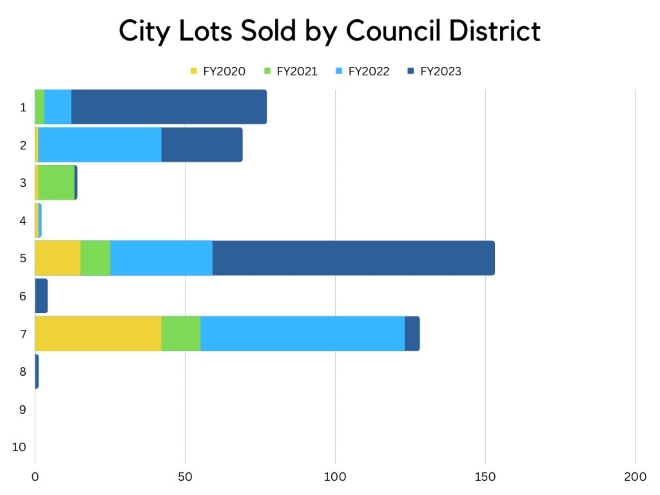
Aaron Moselle at WHYY captures some of the thinking of the Land Bank board members more aligned with Councilmember Gauthier, and who tend to be more skeptical of disposing of land for mixed-income housing — a group that includes Andrew Goodman, CM Gauthier’s Equitable Development Director.
PACDC Executive Director [Rick] Sauer said the Land Bank could buy more land for affordable housing if sold at “minimal cost” to the agency. What’s more, many of the properties disposed through the Land Bank only have temporary affordability, creating a potentially counterproductive system in the long run. Sauer told WHYY:
“We need to look at this issue of not just who it’s affordable to, but for how long. Because otherwise you build an affordable unit and then it’s lost in 15 years, and you’re sort of right back where you’re at, right? And then you no longer have land to build affordable housing in the future. And so that opportunity is sort of lost.”
What’s next?
As a general observation, Sauer, Goodman, and Maria Gonzalez of HACE (also PACDC’s Board Chair) are all very well-intentioned people who want to be more idealistic about the affordability levels, and the length of deed restrictions on affordability, that can be achieved through the city’s Turn the Key and “51/49” programs.
Idealism and creativity in this area of policy are admirable, but also need to be tempered with a dose of pragmatism. There have been several projects where this group of board members has voted No for some of the reasons described in the quote above, sometimes delaying or denying mixed-income housing that residents could have in the here and now.
Overall the Board has good reason to be proud of its recent record of moving a lot more land for housing, and meaningfully increasing the amount of middle-income 60 to 80 percent AMI housing that will soon become available for people who need homes. Moving more land faster has also brought the Land Bank closer to achieving its goals for 30 percent AMI housing — a good sign something about the current approach is working.
Compare this year’s totals to FY2022, which featured less housing of all kinds.
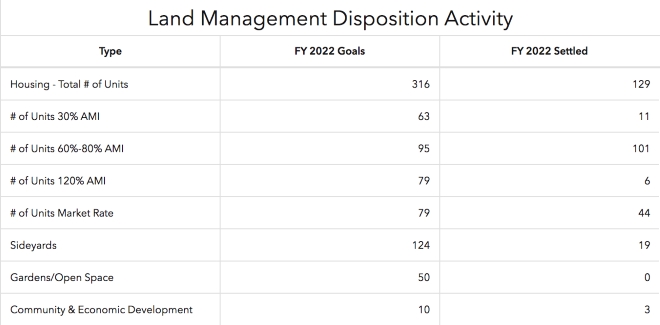
The Mayor and City Council appoint the members of the Land Bank board, so this upcoming primary will affect the Board’s political direction going forward. All of the Mayoral candidates are promising to unclog the Land Bank’s affordable housing pipeline, but one way to differentiate between the candidates is to make some educated guesses about which voting factions on the Land Bank board might be expected to grow or shrink depending on who is elected.
WHYY’s Moselle also reported, “None of the Democratic candidates who spoke with WHYY News — including [Cherelle] Parker, [Rebecca] Rhynhart, and former at-large City Councilmembers Allan Domb, Derek Green, and Helen Gym — said they’re looking to diminish councilmanic prerogative. But they do think the City’s land disposition process would benefit from Council being part of a unified vision around the creation of affordable housing. They say it would not only help speed up the disposition process, but also make it more effective and more predictable.
“‘Right now, what we’re doing is allowing for individual pieces of land to be turned over. It is creating a lot of stress and worry from neighbors who are rightly worried about seeing gentrification,’” Gym told WHYY.
If Gym is elected Mayor, it seems more likely we would see additional appointees from the Sauer/Gonzalez/Goodman idealist camp, while some other candidates might be more likely to appoint people more aligned with current board members Rebecca Lopez-Kriss and Alex Balloon, who have generally been more inclined to vote for middle-income housing proposals to get more vacant lots back into productive use faster.
In reality, this is a little too reductive, and these board members all have a lot of overlapping views and goals, but it’s useful nonetheless for making some inferences about what political direction the different mayoral candidates might take this board in, and how bought-in they may be on the current approach which has proven moderately successful at moving city vacant lots for housing.

Jon Geeting is the director of engagement at Philadelphia 3.0, a political action committee that supports efforts to reform and modernize City Hall. This is part of a series of articles running on both The Citizen and 3.0’s blog.
![]() RELATED STORIES ON PHILLY HOUSING AND DEVELOPMENT
RELATED STORIES ON PHILLY HOUSING AND DEVELOPMENT
Photo by Theo Whyss-Flamm



